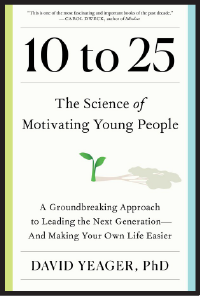The Science Teaching Journal Club originated as a partnership of the Science Literacy Program and the Teaching Engagement Program. Each week we read, discuss, and consider how to implement ideas from an article or book that explores issues relevant to teaching and learning in college science classrooms. We invite participants from all ranks and disciplines to join us for these sessions, which we use to model evidence-based teaching practices.
Thursdays at 9 a.m.
In person: LISB 217 OR
Zoom: https://uoregon.zoom.us/j/369256082
Questions? Please contact Julie Mueller (jmueller@uoregon.edu)
Join the Science Teaching Mailing List
Winter 2026 Journal Club Readings
 Are you interested in learning how to motivate your students to engage in your course, learn the material, and do their own work rather than offloading it to AI? Join the journal club this winter as we read 10 to 25: The Science of Motivating Young People, by David Yeager, Professor of Psychology at UT Austin. This book, which is directed toward instructors as well as parents and employers, considers motivation through the lens of developmental psychology. It couples descriptions of research studies with anecdotes about real people who have succeeded in motivating the young people they interact with.
Are you interested in learning how to motivate your students to engage in your course, learn the material, and do their own work rather than offloading it to AI? Join the journal club this winter as we read 10 to 25: The Science of Motivating Young People, by David Yeager, Professor of Psychology at UT Austin. This book, which is directed toward instructors as well as parents and employers, considers motivation through the lens of developmental psychology. It couples descriptions of research studies with anecdotes about real people who have succeeded in motivating the young people they interact with.
The book is available in downloadable ebook form through the UO Libraries. Participants interested in purchasing their own copies may do so through the usual outlets.
Please contact Julie Mueller if you have trouble accessing the materials.
Tentative Schedule:
| Week | Reading |
|---|---|
| Week One (1/8) | Introduction, pp. 1 - 18 Section I: Understanding Ten-to-Twenty-Five-Year-Olds
|
| Week Two (1/15) | Section I: Understanding Ten-to-Twenty-Five-Year-Olds
|
| Week Three (1/22) | Section I: Understanding Ten-to-Twenty-Five-Year-Olds
|
| Week Four (1/29) | Section I: Understanding Ten-to-Twenty-Five-Year-Olds
|
| Week Five (2/5) | Section II: Mentor-Mindset Practices
|
| Week Six (2/12) | Section II: Mentor-Mindset Practices
|
| Week Seven (2/19) | Section II: Mentor-Mindset Practices
|
| Week Eight (2/26) | Section II: Mentor-Mindset Practices
|
| Week Nine (3/5) | Section II: Mentor-Mindset Practices
|
| Week Ten (3/12) | Section III: Building a Better Future
|
| Finals Week (3/19) | Section III: Building a Better Future
|
